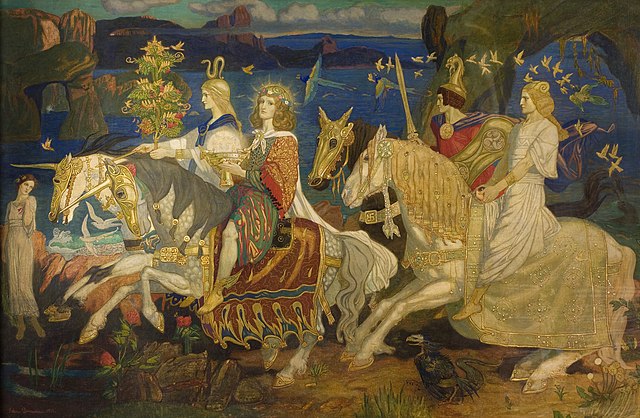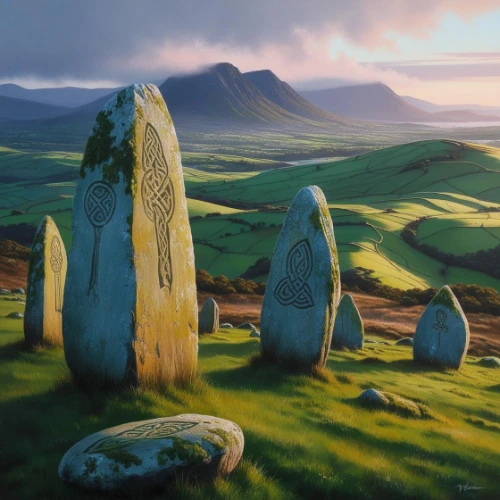Welcome to our exploration of Danu, the mysterious and ancient mother goddess from Irish mythology. While fragments of her story have survived through the centuries, she remains a powerful symbol of creation, fertility, and the natural world’s magic. Let’s dive in and learn more about this important yet elusive figure.
Table of Contents
Celtic Goddess Danu

Celtic Goddess Danu is believed to be the primordial mother goddess of the Tuatha Dé Danann, a group of supernatural beings prominently featured in Irish myths. Although there are few direct references to Celtic Goddess Danu in medieval Irish texts, her legacy can be found in the name of her people—”the tribe of the goddess Danu.” This fact alone shows how central she was to early Irish stories and belief systems.
Who Is Danu?
Danu is often depicted as a nurturing, life-giving figure. Many scholars connect her name to the Proto-Indo-European word dānu, meaning “river” or “water.” This link suggests she could represent flowing water, a vital force that brings fertility and abundance to the land.
The Tuatha Dé Danann: Danu’s Legacy
The Tuatha Dé Danann are central characters in Ireland’s mythological history. These skilled and magical beings were said to arrive in Ireland shrouded in mist and mystery. Their name directly ties them to the Celtic Goddess Danu—she was their founding mother, giving them a hint of divine power and status. Over time, the Tuatha Dé Danann became known in folklore as the Sidhe, or fairy folk, believed to dwell in Ireland’s hidden mounds and hills.
Danu’s Role in Celtic Mythology
Despite her importance, Danu doesn’t appear frequently in written sources. Most of what we know about her comes indirectly—through references to her children, the Tuatha Dé Danann, and comparisons with other Celtic mother deities, like the Welsh goddess Dôn. Some researchers also note connections to European goddess figures linked with rivers and flowing water, suggesting a shared ancestral root in Indo-European cultures.
Symbolism and Attributes of Danu

- Fertility and Abundance: As a mother goddess, Danu is seen as a wellspring of life and growth.
- Water and Rivers: Her name’s meaning and possible links to major European rivers hint at her role as a source of nourishment.
- Creation and Ancestry: Danu’s children, the Tuatha Dé Danann, demonstrate her status as a powerful and creative force.
- Wisdom and Magic: The Tuatha Dé Danann were known for their supernatural abilities, reflecting the gifts they received from their divine mother.
Danu in Modern Interpretations
Today, many people interested in Celtic mythology and Neo-Pagan spirituality view Danu as a symbolic figure of Mother Earth, a powerful female presence who connects us to nature. She often appears as a nurturing, protective deity in modern art and literature, representing the deep bond between land, water, and life.
Sites and Stories Associated with Danu
Direct evidence of Danu’s worship is scarce. However, some scholars link her to places like the “Paps of Anu” in County Kerry, Ireland, where twin hills are said to represent the breasts of a mother goddess. In broader Celtic history, people have also looked to river names (like the Danube) for possible connections to her mythic identity.
The Mystery of Danu
One of the most intriguing aspects of the Celtic Goddess Danu is how little we know about her from ancient records. No epic stories detail her exploits in the way other gods and goddesses were portrayed. Instead, her power is implied through the extraordinary abilities of her descendants. This fragmentary evidence gives her an air of mystery that has intrigued storytellers and spiritual seekers for centuries.
Why Danu Still Matters
Danu’s continuing relevance lies in her representation of life, nature, and renewal. She reminds us of our connection to the world and respecting natural forces. Whether you approach her story from a mythological, spiritual, or purely academic angle, she is a potent example of how deeply ancient cultures valued the divine feminine and our relationship with the environment.
Linking Danu to Other Locations and Cultures
One fascinating element of Danu’s story is how her name and possible influence may appear in places far beyond Ireland. Scholars who study Indo-European mythologies have pointed out that words like dānu (“river” or “water”) can be traced across various regions. This suggests a shared cultural heritage or belief system stretching from the Celtic world into continental Europe and beyond. Here are a few highlights:
- European Rivers: Several of Europe’s major rivers, such as the Danube, the Don, and the Dniester, may connect back linguistically to an ancient root word that also gave rise to the name Danu. Though the exact nature of this link is debated, the recurring “Dan-” element hints at a prehistoric reverence for water deities or river goddesses.
- Comparisons with Other Pantheons: Mother figures or water goddesses also play a central role in some mythologies outside the Celtic sphere. By comparing these stories, researchers sometimes find intriguing parallels that may point to a common Indo-European tradition where deities associated with rivers and fertility held great power.
- Pan-Celtic Connections: Within the Celtic world, you’ll find similar mother or ancestral goddesses—like the Welsh figure Dôn—suggesting that Danu wasn’t confined to Ireland. Instead, she may represent a broader concept of Mother Earth or Mother Water, revered in many Celtic-speaking regions.
These cultural echoes reinforce the idea that Danu’s story is part of a larger tapestry of beliefs, where rivers and fertility were intimately tied to divine influence. While it’s impossible to prove a direct, one-to-one connection between every “Dan-” place name and the Irish Danu, the similarities across languages and landscapes show how ancient reverence for water and motherhood could flow from one culture to another—much like the rivers themselves.
Conclusion
While the written record of Danu may be limited, the power and influence she has in Irish mythology are undeniable. As the mother of the Tuatha Dé Danann, she stands as a crucial figure in Celtic folklore—representing fertility, creation, and the enduring magic of nature. By looking into Danu’s story, we gain a deeper appreciation for the legacy of Irish myths and the timeless appeal of the mother goddess archetype.
Recommended Reading:
- Lady Augusta Gregory’s Gods and Fighting Men
- T.W. Rolleston’s Celtic Myths and Legends
- Marie-Louise Sjoestedt’s Gods and Heroes of the Celts
